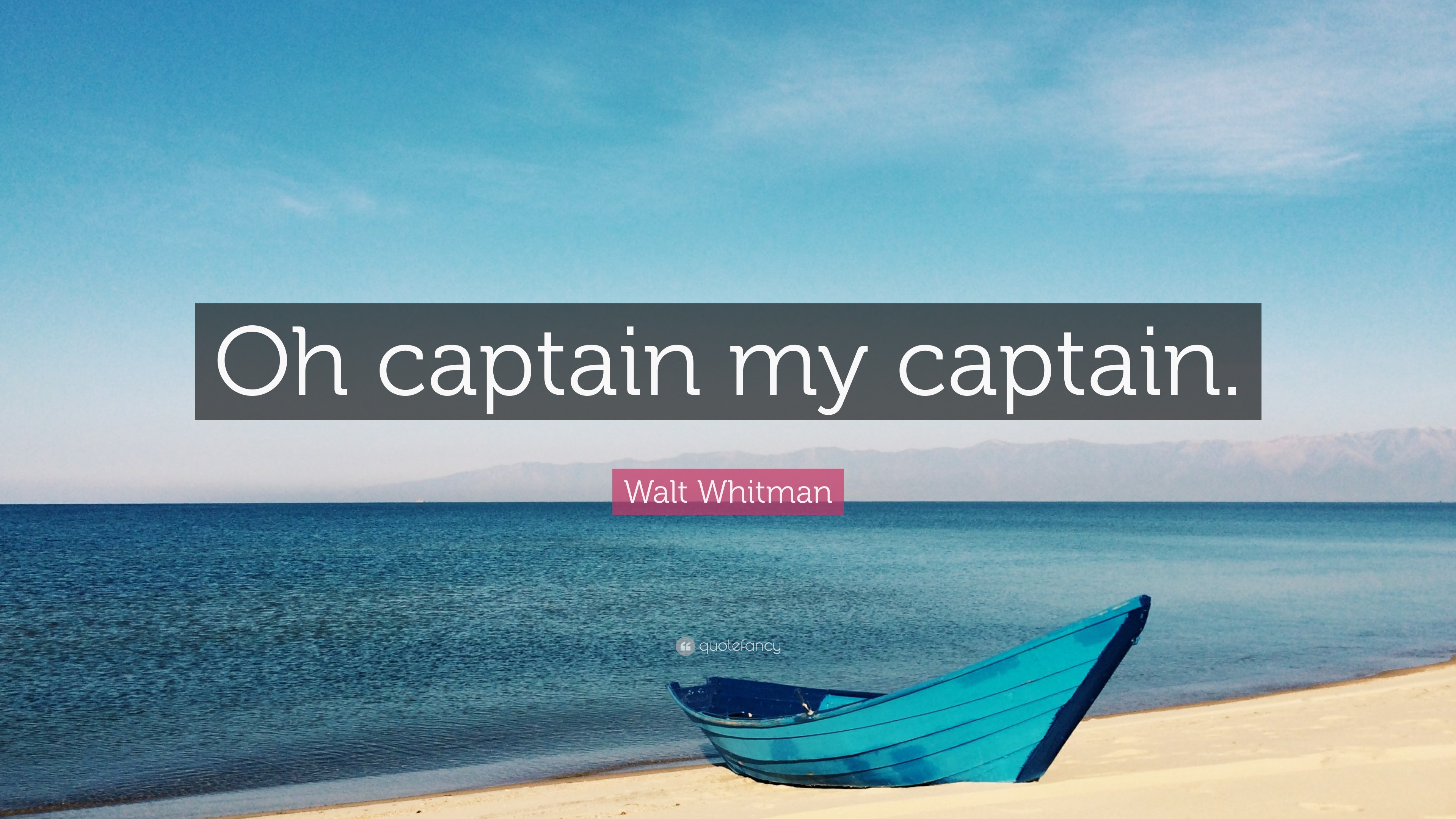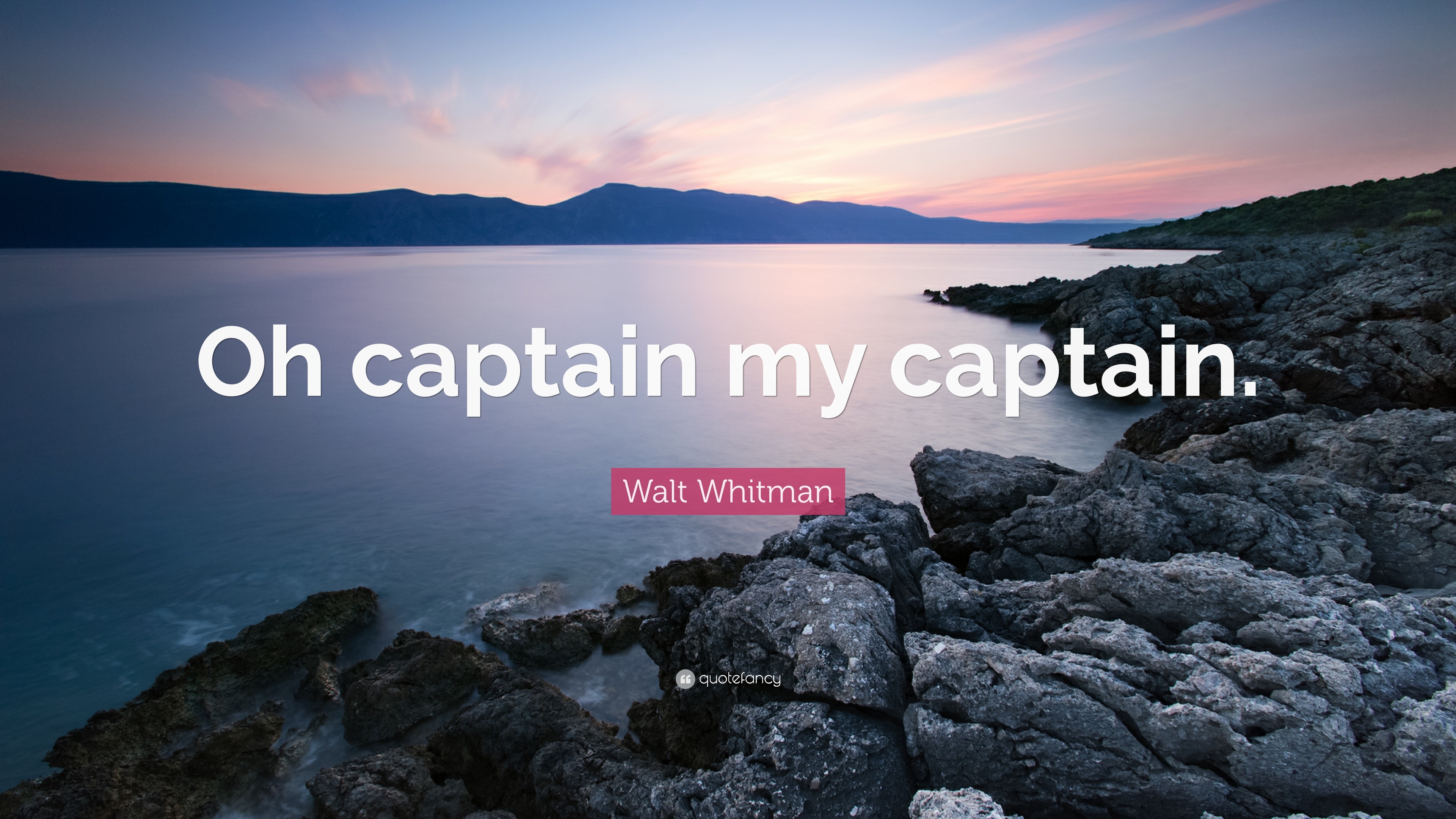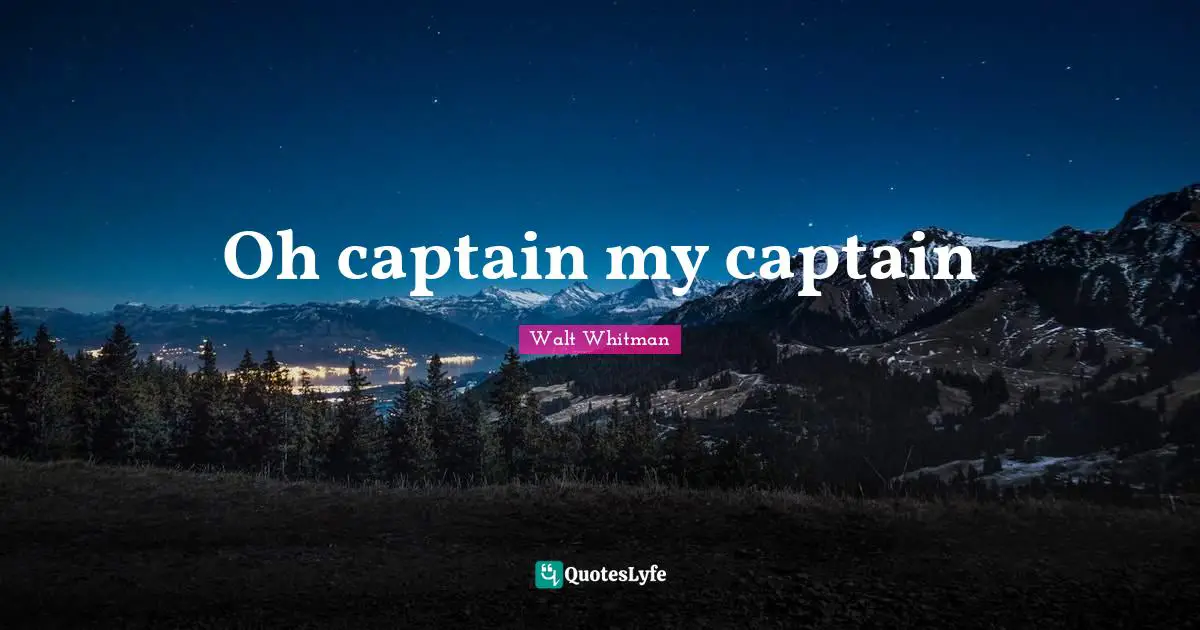The words, "Oh Captain, My Captain," truly resonate with so many people, don't they? It's a phrase that, in a way, just sticks with you, bringing to mind strong feelings of respect, loss, and deep appreciation for someone who has made a big impact. You might have heard it in a movie or perhaps seen it pop up in discussions about leadership, and it's quite powerful, really. This simple set of words carries such a heavy weight, often reminding us of moments when we've looked up to someone, someone who guided us through choppy waters or showed us a new way to see things. It's a shout-out, a recognition, and sometimes, a farewell to a person who truly made a difference in our world.
So, what makes "Oh Captain, My Captain" so special, you ask? Well, it's more than just a line from a poem or a film; it has become a kind of shorthand for a particular type of bond, a connection between those who lead and those who follow. It speaks to the idea of a leader who isn't just in charge, but someone who inspires, someone who sees potential, and someone who, quite frankly, cares deeply. It's about that special person who steps up, takes the helm, and steers everyone toward a shared goal, often against the odds. This phrase captures the very heart of what it means to be a truly impactful figure in anyone's journey.
Today, as a matter of fact, the sentiment behind "Oh Captain, My Captain" feels just as important as it ever did. We are always looking for those guiding lights, those individuals who can bring people together and help them reach for something greater. Whether it's in our schools, our workplaces, or even our communities, having someone who embodies that "captain" spirit can make all the difference. It's a call to remember the value of strong, compassionate guidance and to perhaps, in some respects, even consider how we might embody some of those qualities ourselves for others around us.
- Unveiling The Complexities Of Love An Exploration Of Willa Fitzgeralds Work
- Everything You Need To Know About Chrissy
- Her Fantasy Box Wash
- University Of North Carolina Greensboro
- The Mount Edith Whartons Home
Table of Contents
- The Origin of a Poignant Cry
- Why Oh Captain My Captain Still Matters
- The Core of a Leader's Influence
- Practical Ways to Embrace the Captain Spirit
- Frequently Asked Questions About Oh Captain My Captain
The Origin of a Poignant Cry
The phrase "Oh Captain, My Captain" comes from a very famous poem written by Walt Whitman, a beloved American poet. He penned this particular work in 1865, and it was a heartfelt tribute to Abraham Lincoln, the 16th President of the United States, following his assassination. Lincoln, you see, was often seen as the "captain" who had steered the ship of state through the incredibly rough seas of the Civil War. The poem expresses deep sorrow and admiration for a leader who had achieved so much but was tragically lost too soon. It's a moment of profound grief mixed with immense respect, really.
This poem, in a way, quickly became one of Whitman's most recognized pieces, even though he himself sometimes felt it overshadowed his other works. Its simple yet powerful language struck a chord with many people who were also mourning Lincoln's passing. It captured a collective feeling of loss for a figure who had, by all accounts, held the country together during its most trying period. The image of a ship, a captain, and a difficult journey is a pretty universal one, which probably helps explain why the poem resonated so widely then, and still does now, as a matter of fact.
Later on, the phrase got a whole new life through the popular 1989 film *Dead Poets Society*. In that movie, an inspiring English teacher, played by Robin Williams, encourages his students to think for themselves and to truly live their lives with passion. His students, in a very touching scene, stand on their desks and utter "Oh Captain, My Captain" as a final show of respect and defiance after he is unfairly dismissed. This scene, arguably, cemented the phrase in modern popular culture, giving it a fresh meaning tied to mentorship, unconventional teaching, and standing up for what you believe in. It really showed how a powerful phrase can adapt and take on new layers of meaning over time.
- Halifax Stanfield International Airport
- Hopkins International Airport Cleveland
- When To Use Screenshots In Lapse Reporting
- Unbreakable Bond Arik Armsteads Marital Journey
- Embrace Resilience Sami Zayns Guide To Moving On
Why Oh Captain My Captain Still Matters
The enduring appeal of "Oh Captain, My Captain" isn't just about its historical roots or its cinematic moments; it speaks to something very fundamental about human connection and the need for guidance. It's about that special bond between a leader and those they guide, a relationship built on trust and shared purpose. Think about it: in any group, whether it's a sports team, a project group at work, or even a family, there's often someone who takes on that "captain" role, someone who helps everyone else find their footing and work together. This phrase, in a way, celebrates those people.
It reminds us that true leadership isn't always about power or authority; it's often about inspiring others to reach their own potential. A good captain doesn't just give orders; they foster an environment where everyone feels like they belong and can contribute. This phrase, you know, captures that feeling of profound gratitude and sometimes, a bit of sorrow when such a guiding presence is gone. It's a testament to the lasting impact one person can have on the lives of many, and how those connections can stay with us for a very long time, really.
The Balance of Leadership and Followership
When we consider what makes a group work well, it's pretty much about balance, isn't it? Just like in chemistry, where lithium, a group 1 metal, forms a positive ion, and a hydroxide anion has a negative charge, and when they come together, there's a 1:1 stoichiometry, a kind of perfect pairing. Similarly, in any group dynamic, there's this delicate balance between the leader and the people who follow them. When a leader and their team are truly in sync, it's almost like they're making music together, finding a rhythm that allows everyone to contribute equally and harmoniously. This kind of mutual understanding is pretty essential for things to move forward smoothly.
A good leader, in some respects, understands that their role is not just to direct, but to also listen and respond to the needs of their team. It's a give and take, a precise kind of interaction where the leader provides the vision and support, and the team offers their skills and dedication. This creates a kind of equilibrium, a stable arrangement where everyone feels valued and understood. This balanced approach, quite frankly, makes the whole group stronger, allowing them to face challenges with a unified front. It's a lot like how different elements combine in a very specific way to create something new and stable.
When It's Time to Move On
Sometimes, even the most effective partnerships or leadership roles need to change, and that's just a part of life, isn't it? Think about a "leaving group" in a chemical reaction; it has to be able to part with its electrons fairly easily for a new bond to form. In the same way, a good leader, or even a team member, knows when it's appropriate to step back or let go, allowing for new structures or ideas to take hold. This isn't always easy, but it's a sign of strength and a recognition that growth often means embracing change. It requires a kind of wisdom to know when to hold on and when to release.
This idea of a "leaving group" can also apply to how we approach challenges. There are times when a certain approach or a particular way of doing things might no longer serve the group's best interest. A wise captain, you know, understands that sometimes the most courageous act is to let go of old methods or even personal attachments for the collective good. It's about being adaptable and recognizing that progress often comes from making room for something different. This willingness to adapt is, quite frankly, a hallmark of effective and lasting leadership, allowing new possibilities to emerge.
Finding Common Ground and Resolution
In any group, there will, of course, be moments of disagreement or tension. It's just natural. But a true captain knows how to bring things back into balance, much like when an acid and a base are placed together; they react to neutralize each other, producing a salt. This process of neutralization is a perfect picture of how conflicts can be resolved, turning potential friction into something stable and useful. The goal, really, is to find that common ground, that point where opposing forces can come together to create a harmonious outcome. It's about finding solutions that work for everyone involved.
A leader might, for example, carefully "titrate" a situation, much like adjusting the concentration of a solution, to find the right amount of input or intervention needed to resolve an issue. This careful, measured approach helps to avoid extreme reactions and ensures that the outcome is fair and sustainable. It’s about listening to different perspectives and gently guiding the conversation towards a shared understanding. This ability to facilitate resolution and bring people together, even after a disagreement, is a very valuable skill, making the group stronger and more resilient in the long run.
The Core of a Leader's Influence
What really makes a "captain" so impactful? It often comes down to their core characteristics, the very foundation of who they are. Think about a parent metal with an electronic configuration like 2:8:2, which means it has 12 electrons. This configuration represents its fundamental nature, its inherent properties. Similarly, a leader's influence often stems from their own deeply held values and principles. These core beliefs are what guide their decisions and shape their interactions with others, providing a stable base for their actions. It's about having a strong internal structure that informs everything they do.
These core principles are, in a way, what give a leader their unique "charge" or presence. Just as a specific electronic configuration determines how a metal will behave, a leader's foundational beliefs dictate how they will lead. They don't just react to external pressures; they operate from a place of conviction, which, quite frankly, inspires confidence in those around them. This deep-seated integrity is what allows them to remain steady even when things get tough, providing a consistent and reliable presence for their team. It's this inner strength that truly defines a captain.
Moreover, a captain's influence is also shaped by their ability to understand and adapt to the broader context around them. Just as the metallic character of basic oxides changes across the periodic table, increasing from right to left and from top to bottom, leaders must be aware of trends and shifts in their environment. They need to understand how different situations might call for different approaches, always keeping an eye on the bigger picture. This awareness allows them to steer their team effectively, anticipating challenges and seizing opportunities, rather than just reacting to them. It's a continuous process of learning and adjusting, really.
Practical Ways to Embrace the Captain Spirit
So, how can we, in our own lives, embody some of that "Oh Captain, My Captain" spirit? It's not about being in charge of a ship, of course, but about showing up for others and making a positive impact. One way is to really listen to people, truly hear what they are saying, and understand their perspectives. This kind of genuine attention can make a huge difference, making people feel valued and seen. It's about being present and engaged, which, frankly, is a cornerstone of good human connection.
Another important aspect is to be a source of stability and encouragement, especially when things feel uncertain. Just as a leader might carefully measure and adjust, like determining the hydroxide concentration in a solution, you can offer thoughtful support and guidance. This means being reliable and consistent, someone others can count on when they need a bit of reassurance or a clear path forward. It's about being that steady presence, the one who helps to calm the waters when they get a bit rough, you know.
Furthermore, consider how you can help others discover their own strengths and potential. A great captain isn't just about their own achievements; they're about helping everyone on their team shine. This could mean offering a helping hand, sharing knowledge, or simply believing in someone when they might not fully believe in themselves. It’s about fostering an environment where everyone feels empowered to grow and contribute. This kind of supportive approach truly builds up those around you, making a lasting positive impact, as a matter of fact. You can learn more about effective team dynamics on our site, and link to this page for more leadership insights.
Finally, remember that showing appreciation for those who guide you is a very powerful thing. Just as the phrase "Oh Captain, My Captain" is a tribute, taking a moment to acknowledge the people who have made a difference in your life can strengthen those bonds. It’s a simple gesture, yet it carries so much weight, reinforcing the connections that help us all navigate our individual and collective journeys. This mutual respect and recognition are what truly make communities and groups thrive, creating a cycle of positive influence, arguably.
Frequently Asked Questions About Oh Captain My Captain
What is the origin of "Oh Captain, My Captain"?
The phrase comes from a poem written by Walt Whitman in 1865. He wrote it to honor Abraham Lincoln after the president's assassination. It's a very touching piece that really captures the sorrow and admiration people felt for Lincoln at that time. It became quite famous, and its meaning, in a way, just grew over time.
What movie features "Oh Captain, My Captain"?
The phrase is famously used in the 1989 film *Dead Poets Society*. In a very memorable scene, students stand on their desks and say "Oh Captain, My Captain" to their beloved teacher, Mr. Keating, as a sign of respect and support. That movie, you know, really brought the phrase to a whole new generation and gave it a fresh context of inspiring mentorship.
What does "Oh Captain, My Captain" symbolize?
It typically symbolizes deep respect, admiration, and sometimes sorrow for a beloved leader or mentor. It represents someone who has guided others through difficult times, inspired them, or taught them valuable lessons. It's about the profound impact one person can have on the lives of many, and the lasting bond that forms, really. It’s a powerful way to acknowledge someone’s influence.
Related Resources:



Detail Author:
- Name : Kirstin Kassulke
- Username : lacey74
- Email : rosanna.conn@bode.com
- Birthdate : 1997-07-19
- Address : 1396 Austin Village Suite 426 North Margarettberg, VA 71784
- Phone : 1-832-641-7876
- Company : White, Collier and Kertzmann
- Job : Chemist
- Bio : Magni quo vero atque quia non eos. Hic rerum officiis non est. Explicabo qui natus vel inventore dicta eveniet voluptates.
Socials
tiktok:
- url : https://tiktok.com/@kolby_ledner
- username : kolby_ledner
- bio : Qui quas ratione voluptas doloribus ducimus aut saepe repudiandae.
- followers : 5941
- following : 843
instagram:
- url : https://instagram.com/kolby_ledner
- username : kolby_ledner
- bio : Est reprehenderit voluptatum et aut qui unde nihil. Et autem quidem voluptatum est.
- followers : 3436
- following : 273
facebook:
- url : https://facebook.com/kolbyledner
- username : kolbyledner
- bio : Assumenda debitis praesentium ut ducimus est et.
- followers : 3277
- following : 2578
twitter:
- url : https://twitter.com/kolby938
- username : kolby938
- bio : Et sit aut sit minima voluptate ut. Pariatur possimus assumenda laboriosam ad fugiat natus. Inventore dolores illum voluptatem totam est ad.
- followers : 404
- following : 343